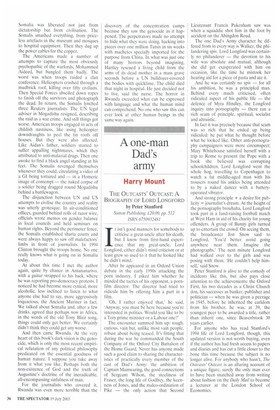A one-man Dad's army
Harry Mount
THE OUTCASTS' OUTCAST. A BIOGRAPHY OF LORD LONGFORD by Peter Stanford Sutton Publishing, £20.00, pp. 512 ISBN 0750932481 1 t isn't good manners for somebody to criticise a great-uncle after his death, but I know from first-hand experience that my great-uncle, Lord Longford, either didn't mind criticism or at least grew so used to it that he looked like he didn't mind.
After he appeared in an Oxford Union debate in the early 1990s attacking the porn industry, 1 asked him whether he minded the tactics of his opponent, a pornfilm director. The director had tried to ridicule him by offering him a part in a film.
'Oh, I rather enjoyed that,' he said, 'Anyway, you must be here because you're interested in politics. Would you like to be a Tory prime minister or a Labour one?'
The encounter summed him up: tough, curious, vain but, unlike most vain people, robust about being teased. It's fitting that during the war he commanded the South Company of the Oxford City Battalion of the Home Guard. Never has anyone made such a good claim to sharing the characteristics of practically every member of the cast of Dad's Army: the ambition of Captain Mainwaring, the good connections of Sergeant Wilson, the steeliness of Fraser, the long life of Godfrey, the keenness of Jones, and the malco-ordination of Pike — the only action that Second
Lieutenant Francis Pakenham saw was when a squaddie shot him in the foot by accident on the Abingdon Road.
The one Dad's Army character he differed from in every way is Walker, the philandering spiv. Lord Longford was certainly no philanderer — the devotion to his wife was absolute and mutual, although she did get exasperated with him on occasion, like the time he mistook her hearing aid for a piece of pasta and ate it.
And he was certainly no spiv — for all his ambition, he was a principled man. Behind every much criticised, often ridiculed aspect of his public life — the defence of Myra Hind Icy, the Longford inquiry into pornography — there ran a rich seam of principle, spiritual, socialist and altruistic.
In fact it was precisely because that seam was so rich that he ended up being ridiculed: he put what he thought before what he looked like. Other anti-pornography campaigners were more circumspect: Mary Whitehouse satisfied herself with a trip to Rome to present the Pope with a book she believed was corrupting schoolchildren. Lord Longford went the whole hog, travelling to Copenhagen to watch a fat middle-aged man with his trousers round his ankles being attended to by a naked dancer with a batteryoperated vibrator. And strong principle + a desire for publicity = journalist's dream. At the height of the pornography brouhaha, Lord Longford took part in a fund-raising football match at West Ham in aid of his charity for young offenders. A group of Bunny girls turned up to entertain the crowd. On seeing them, the broadcaster Jon Snow said to Longford, 'You'd better avoid going anywhere near them. Imagine the photographs.' The next minute Longford had walked over to the girls and was posing with them. 'He couldn't help himself,' said Snow. Peter Stanford is alive to the comedy of incidents like this, but also pays close attention to the achievements: the Oxford First, his two decades as a Christ Church don, his successes as banker, publisher and politician — when he was given a peerage in 1945, before he inherited the earldom from his brother, he was. at 39, the youngest peer to be awarded a title, rather than inherit one, since Beaverbrook 30 years earlier. For anyone who has read Stanford's 1994 life of Lord Longford, though, this updated version is not worth buying, even if the author has had fresh access to papers and diaries and has cut a little closer to the bone this time because the subject is no longer alive. For anybody who hasn't, The Outcasts' Outcast is an alluring account of a unique figure, surely the only man ever to have been snatched away from writing about fashion on the Daily Mail to become a lecturer at the London School of Economics.


























































 Previous page
Previous page